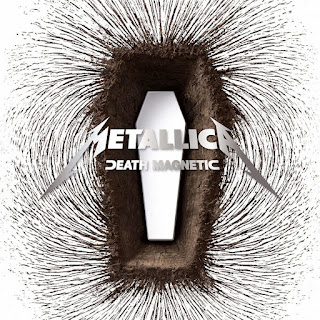Metallica/Death Magnetic/2008
For many in Generation Y their first exposure to Metallica was probably Enter Sandman or Until It Sleeps. That thought just blows my mind. As a proud, card-carrying member of Generation X, I grew up with a very different Metallica. My Metallica was a band that you did not hear on the radio or see on MTV. They did not release albums with lofty commercial expectations. They rejected their peers in the music industry. They mocked them. They viewed themselves as fans that happened to be on stage. Their stage clothes consisted of tattered blue jeans, unwashed hair, and bad acne. Their bass player was still wearing bell-bottoms in 1986. Their sound was both uncompromising and trail blazing. They were at the forefront of a new strain of metal music that would become known as Thrash. Unlike eighties hair metal, this new music bore no resemblance to Chuck Berry’s rock-n-roll. It was a fusion of underground European metal and hardcore punk. All speed, no swing. Their tapes circulated around my high school like a bag of skunk weed or a lesbian porno. It was contraband. For this introverted and misunderstood teen, Metallica was dangerous and taboo. It was must have music.
Then came 1991 and everything changed.
Metallica became the mainstream.
After seventeen years of radio airplay, music videos, award ceremonies, magazine covers, photoshoots, interviews, documentaries, major motion pictures, soundtracks, therapy sessions, rehab, tribute albums, line-up changes, and enough self indulgent musical experimentation to make Styx blush, Metallica have allegedly returned to their roots with 2008’s Death Magnetic. The results are mixed.
The album starts off with a heartbeat as if to indicate that the Metallica of old are still alive and are just seconds away from reemerging from an almost two decade slumber. The beating heart segues directly into That Was Just Your Life, an at times thrashy number that features James Hetfield almost rapping (!) the lyrics. The End of the Line follows and is, in my opinion, the best track on the album. The track features all the trademark riffing one would expect from classic Metallica and boasts several dynamic shifts in tempo and mood. The third track is also the albums first single — The Day That Never Comes starts off by borrowing liberally from 1984’s Fade to Black and concludes by essentially rewriting 1988’s One. It’s a good song but seems a bit too familiar. It’s also on this track that the most problematic aspect of Death Magnetic is most evident...
Clipping.
When the chorus of The Day That Never Comes kicks in you will start to wonder if you’ve blown a speaker. Fear not, your stereo is fine. It’s the song that sucks. Or more specifically, the songs post production. You have just fallen victim to The Loudness Wars. Much has been written about The Loudness Wars online, I’m not going to rehash it here. You can research it yourself. But to make a long story boring, music has been mastered at increasingly higher volumes for the past twenty years, thus resulting in a product that while louder, sacrifices dynamics and range. Oh... and it clips.
Death Magnetic makes your speakers sound like they are farting. Which coincidentally is what 1988’s ...And Justice for All made my speakers do too. Just check out the intro to the track Eye of the Beholder. Which begs the question -- how can one of the wealthiest and most successful bands in the world consistently put out records that sound like shit? Death Magnetic is clipped beyond the threshold of enjoyable listener-ship, ...And Justice for All had zero bass guitar but somehow still managed to make my speakers fart, and 2003’s St. Anger was a complete creative and audible abortion. Do they even care? I seriously have to wonder. I saw Metallica in concert on the Death Magnetic tour. Kirk Hammet managed to butcher the iconic intro solo to Fade to Black. It’s a song he’s probably played a million times since its release in 1984. Sometimes I think they are just going through the motions.
Sonics aside, Death Magnetic starts out strong through four tracks and then fades the rest of the way. We are given a completely unnecessary third part to the Unforgiven. The chorus reminds me of Creep by the Stone Temple Pilots and James actually sounds bored singing it. Cyanide and The Judas Kiss sound like Load era tracks. Suicide & Redemption is okay, but easily becomes their fifth best instrumental behind Orion, The Call of Cthulhu, Anesthesia (Pulling Teeth), and To Live is To Die. The closing track, My Apocalypse is my least favorite. It sounds like a forced rewrite of 1986’s Damage Inc.
Death Magnetic has its moments and is definitely Metallica’s strongest effort in over a decade. Unfortunately for Metallica, they will always be both blessed and cursed by the strength of their own early legacy. They have coasted on the success of their first four landmark albums for nearly twenty years. They have used their legendary stature as creative license to explore whatever misguided musical whim they please. They have tested their fans loyalty and with Death Magnetic, they hope to win them back. Perhaps with the muscular production of Master of Puppets they might have succeeded. Instead we have the fuzzed out and over-cooked clip job that is Death Magnetic, leaving this fan to wonder if they even care. 6.5/10



Comments
Post a Comment